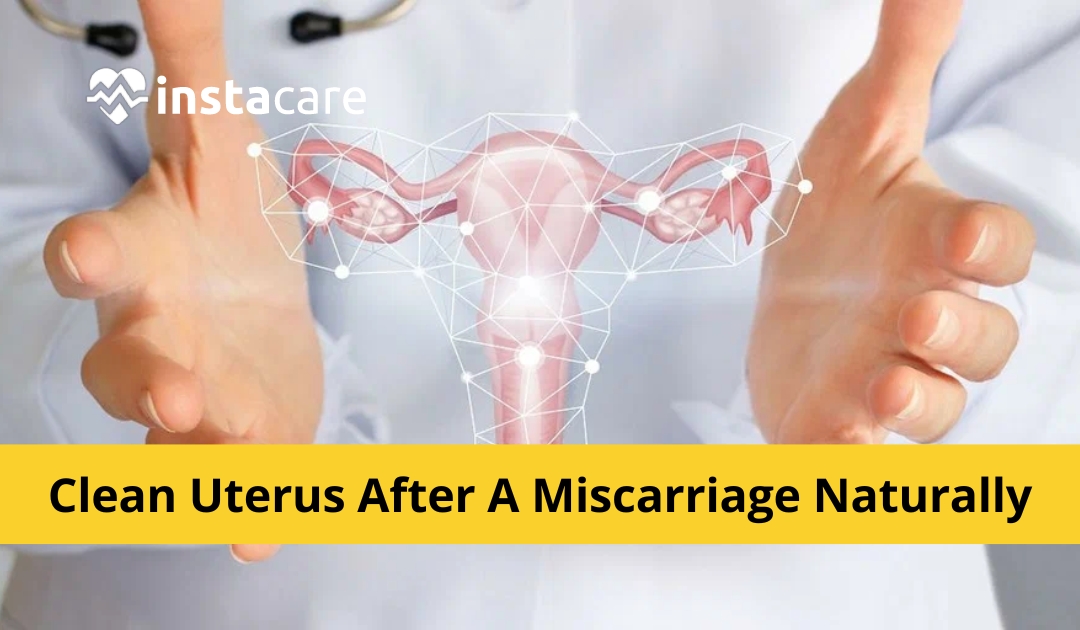If you’ve recently experienced a miscarriage, the emotional turmoil may be overwhelming. But even during this tough time for both your body and mind, it’s important to not forget about caring for yourself physically as well. While medical personnel at a hospital or clinic can provide more comprehensive care to help you recover from a pregnancy loss, there are many natural steps that you can take at home that will aid in uterus cleanse after the event. So if you're wondering how to clean uterus after a miscarriage naturally at home, then read on and discover some simple tips that can help your body heal, while being gentle and respectful of what it's been through.
What is a miscarriage and what are the symptoms of one
A miscarriage is a pregnancy loss that occurs before the 20th week of gestation. Some signs and symptoms of a miscarriage include vaginal bleeding, which can range from light spotting to very heavy bleeding, cramping, back pain, and passage of tissue or fluid from the vagina.
If these symptoms occur during pregnancy, it is important to seek medical attention right away, as these can indicate a miscarriage. Unfortunately, in many cases, a miscarriage cannot be prevented; however, there are some lifestyle changes that may reduce the risk such as avoiding certain activities that can cause injury or trauma to the abdomen and reducing stress.
How to clean uterus after a miscarriage naturally at home
After a miscarriage, it is important for a woman's health to ensure her uterus has been fully cleaned. There are a few natural remedies that can be used to support the cleaning process from the comfort of one's home. One common remedy to help cleanse the uterus is to drink a tonic made from diuretic herbs such as chamomile or ginger tea.
This can have an overall beneficial effect on reproductive organs and help reduce any potential infection. Additionally, practitioners of traditional chinese medicine recommend taking steps to strengthen the uterus through gentle exercises like healing meditations and yoga poses specifically designed for uterine health. Lastly, bodywork such as massage or cupping may be beneficial by helping these organs relax and strengthening them in support of uterine health.
How to clean uterus after a miscarriage at home?
1- Make sure to eat healthy
Eating healthy is essential for staying healthy and maintaining a well-balanced diet. Eating a variety of different fruits, vegetables, and whole grains is an important part of achieving good nutrition. You can also include lean meats, fish, eggs and nuts in your meals. Making sure to get enough vitamins from the food you eat is another way to promote good health. Avoiding processed foods or packaged snacks can help reduce unhealthy saturated fats.
Getting enough sleep, drinking water and exercising are additional ways to make sure your body has the nutrients it needs to stay fit and active. Making time for healthy cooking at home can be a great way to gain control over what goes into your body – you'll be able to choose fresh ingredients that are low in sodium and avoid too much sugar or fat in your meals. Clean eating isn't hard when you have plenty of guidance and support!
2- Stress management
Stress can be a huge burden, both mentally and physically. Thankfully, there are many ways to effectively manage the anxiety and strain it can cause. One of the most important aspects of dealing with stress is prioritizing your own wellbeing. Make time for activities that promote relaxation, such as reading a book, taking a warm bath or going for a walk in nature.
Additionally, speaking with close friends and family about your stressors can provide valuable emotional support for difficult moments. Lastly, practicing breathing exercises and other forms of mindful meditation are excellent tools to use when overwhelmed. With the right strategies in place, anyone can begin their journey to healthier stress management!
3- Herbal antidotes
Herbal antidotes are a natural way for those looking to heal their body and mind, without the use of conventional medications. How to clean uterus after a miscarriage at home? Is one such issue that herbal remedies can assist with. Herbs such as lemon balm, thyme, and chamomile are often used to induce sweating which helps expel toxins from the body. Other herbs like black cohosh can be consumed in tea form or taken as a supplement to reduce menstrual cramping.
In addition, taking herbs such as cinnamon and ginger may reduce inflammation in the abdomen after a miscarriage, helping reduce the trauma associated with the event and aiding in uterine healing. Lastly, drinking plenty of water and consuming fresh fruits and vegetables will help replenish nutrients lost throughout this process.
4- Take rest and proper medications
Rest and proper medications are a vital part of recovering from a miscarriage. It is essential to take it easy and stay hydrated during this time. Getting sufficient sleep can help relieve stress, speed up healing, and provide the body with more energy. If prescribed, make sure you take any medications as directed by your doctor.
Additionally, though it may be difficult emotionally and physically, maintaining menstrual hygiene should also be attended to; for example, taking steps to clean the uterus after a miscarriage at home can reduce infection risk and support improved health overall.
5- Hot and cold compress
Hot and cold compresses can be an effective way to ease the discomfort felt during a miscarriage and help with the healing process. How to clean uterus after a miscarriage at home is an important step to take, as it helps ensure that all of the blood and tissue from the pregnancy has been expelled.
Using a hot compress will help relax the muscles in your lower abdomen, while a cold compress can provide relief from pain or inflammation that may occur after a miscarriage. Alternating between hot and cold compresses for about twenty minutes at a time is generally recommended for recovery. Talk to your doctor about how long you should use these compresses, depending on the severity of your situation.
5- Nutrient-rich diet
Making sure to get a nutrient-rich diet is key to maintaining a healthy and balanced lifestyle. Eating foods that are high in protein, fiber, vitamins, and minerals such as lean meats, beans, legumes, fruits, vegetables and whole grains can help provide the body with the energy it needs to perform daily activities. Getting adequate amounts of fruits and vegetables each day can also help keep your immune system strong while providing the body with essential vitamins and minerals.
Additionally, limiting added sugars, unhealthy fats and processed foods can go a long way towards improving overall health. How to clean uterus after a miscarriage at home varies widely depending on what advice one's doctor or midwife may have given; generally speaking gentle treatment like warm pads applied for relief should suffice.
Types of miscarriages
1- Complete miscarriage
A miscarriage is the loss of a pregnancy before 20 weeks gestation. It's estimated that 10 to 20 percent of all pregnancies end in miscarriages, making it one of the most common types of pregnancy loss. There are two types of miscarriages—complete or incomplete.
A complete miscarriage is when all fetal tissue passes from the uterus. This may happen quickly or take several days or weeks depending on the situation. It can be accompanied by moderate to severe bleeding, cramping and abdominal pain. While a complete miscarriage can be emotionally painful for those who've experienced it, there is also relief knowing that the pregnancy has ended and no more steps are needed for care.
2- Incomplete miscarriage
Incomplete miscarriage is a type of pregnancy loss where the tissue left in the uterus after a miscarriage starts to pass out of the body on its own. It is also known as incomplete abortion or missed abortion and can lead to uterine infection or heavy bleeding. When an incomplete miscarriage occurs, there are different types of ways it can manifest such as an inevitable, incomplete, missed or septic miscarriage.
In an inevitable miscarriage, either light or heavy bleeding may occur with accompanying signs and symptoms of pain. An incomplete miscarriage involves only a partial amount of fetal and placental material being expelled from the vagina. A missed miscarriage refers to when there is no onset of any bleeding but scans reveal a fetus that has passed away several weeks ago. Lastly, a septic abortion is a rare yet serious complication which occurs as a result of bacterial infections around the placenta and uterus.
3- Missed miscarriage
Miscarriage is one type of pregnancy loss, where a baby dies before 20 weeks gestation. Missed miscarriages are one type of miscarriage in which the baby has died in the womb but has not expelled from the body. This type of miscarriage usually goes unnoticed; therefore, it can be emotionally devastating for a woman and her family who were unaware that their pregnancy ended.
Common signs of missed miscarriage include lack of fetal movement, no rise in hcg levels, and no heartbeat detected by ultrasound. Receiving diagnosis of missed miscarriage can be difficult to process, and there are many ways to cope such as seeking emotional support resources and being mindful to rest and take care of yourself during this time.
View More: 10 Foods That Can Cause Miscarriage
4- Septic miscarriage
A septic miscarriage is a type of miscarriage caused by infection. The infection can be introduced in the uterus through medical procedures, such as dilation and curettage (d&c), or it can come from the placental tissue itself. Symptoms include fever and abdominal pain, as well as vaginal bleeding.
In extreme cases, the infection can put a pregnant woman's life at risk, requiring hospitalization for monitoring and possible treatment. Often though, if caught early enough, a septic miscarriage can be treated with antibiotics. It's important for women to speak with their doctor if they are experiencing symptoms so that an appropriate diagnosis and treatment plan can be established.
5- Threatened miscarriage
A threatened miscarriage is a type of miscarriage that can occur anywhere from 6 to 12 weeks into a pregnancy. It is the most common type of miscarriage and is considered one of the leading causes in first trimester losses. The symptoms of a threatened miscarriage include cramping, bleeding or spotting, and lower back pain. While it’s scary to experience these symptoms and be told that your pregnancy may be at risk, know that not all cases carry through to an actual miscarriage.
To increase your chances for a successful pregnancy, women should cut down on activity and rest more. Eating healthy foods, reducing stress levels, and seeking professional help are also recommended following a suspected threatened miscarriage.
6- Inevitable miscarriage
Unfortunately, miscarriage is a common occurrence in pregnancy, with approximately 15 - 20% of pregnancies resulting in them. The type of miscarriage experienced varies and includes threats, either where the body begins to reject the fetus or there are other physical issues threatening its survival.
There are also complete miscarriages where the fetus has stopped developing or is no longer present while incomplete miscarriages involve fetal death with some remnant of the pregnancy remaining. While these occurrences can lead to feelings of anxiety and fear, it is important to remember that it is out of your control and no-one can predict if it will happen. It's important to seek qualified medical advice on how to cope when faced with a diagnosis like this.
7- Recurrent miscarriage
Recurrent miscarriage can be a traumatic and emotionally charged experience for a couple who are trying to conceive. This type of miscarriage affects around 1 in 100 couples and is defined as three or more consecutive miscarriages. Scientists have identified two distinct types of recurrent miscarriage; recurrent early pregnancy loss, which occurs during the first trimester of pregnancy; and habitual aborter type, which occurs during the second trimester.
The cause is associated with a variety of factors such as genetic, immunologic, cervical and hormonal problems that can often be diagnosed with an evaluation by a fertility specialist. Fortunately, in many cases the underlying dysfunction can be treated allowing for future successful pregnancies.
View More: What Is The Best Age To Get Pregnant
8- Miscarriage due to abnormal pregnancy
Miscarriage due to abnormal pregnancy is a common type of miscarriage that couples may experience. As with all miscarriages, it can be difficult to cope with the grief and loss but it's important to remember that in many cases, there is no specific cause; it simply happens.
Types of miscarriages due to abnormal pregnancy include chromosomal abnormalities, hormonal imbalances, physical abnormalities in the uterus or cervix, and infections. A woman who has experienced an abnormal type of miscarriage should seek assistance from her doctor for future pregnancies as these types of issues need specialized care. Knowing the type of miscarriage can help a woman plan ahead and assess her risks during the next pregnancy.
What are the benefits of cleaning uterus after a miscarriage naturally at home?
After suffering from a miscarriage, some women opt to clean their uterus naturally at home. This can be beneficial for both mental and physical health. Firstly, this allows for a more control environment for women to grieve in. It also prevents the woman from undergoing further stress due to medical procedures.
Additionally, cleaning the uterus naturally at home could save potential costs of doctor's visits as well as time spent in a hospital setting. Furthermore, natural cleaning provides an increased sense of empowerment and recovery from the trauma of losing a pregnancy. Therefore, pursuing natural cleaning can provide emotional comfort while helping to reduce discomfort associated with uterine contractions that occur after a loss of pregnancy or delivery.
How to take care of yourself emotionally and physically after a miscarriage?
Losing a baby in a miscarriage can be an emotionally and physically difficult time. It’s important to not only grieve the loss of your child, but also to nurture yourself emotionally and physically throughout this difficult process. One way you can take care of yourself emotionally is to find a safe space with family or friends that can provide understanding and comfort. Writing down your thoughts and feelings can also be beneficial - either through a journal or talking to a therapist who specializes in grieving losses.
Physically, it's important to give yourself time off from day-to-day activities while resting properly, eating healthy meals with wholesome nutrients, and taking walks or doing other gentle forms of exercise. Be mindful of activities that may cause too much stress on the body like heavy strenuous activity, alcohol or drugs. Taking care of your emotional and physical health during this difficult time will help you move forward as you continue to heal.
Conclusion
Cleanliness is very important after a miscarriage. There are many ways to clean your uterus, but some methods may be better than others. Be sure to consult with your doctor before trying any method, and always follow instructions carefully. Remember that it is also important to take care of your emotional health during this time. Grieving and seeking support from loved ones can be just as important as physical healing after a miscarriage.
Please book an appointment with the best Gynecologist in Lahore, Karachi, Islamabad, and all major cities of Pakistan through InstaCare, or call our helpline at 02137136090 to find the verified doctor for your disease.
Source: https://instacare.pk/blog/how-to-clean-uterus-after-a-miscarriage












